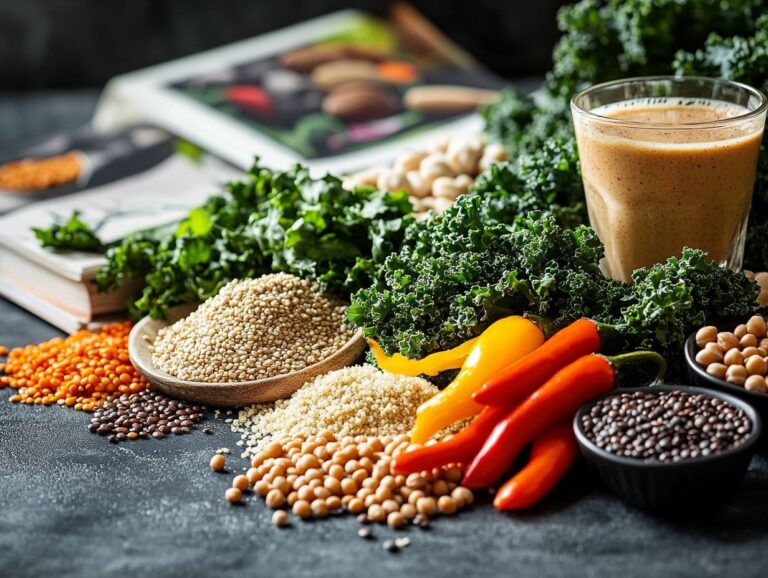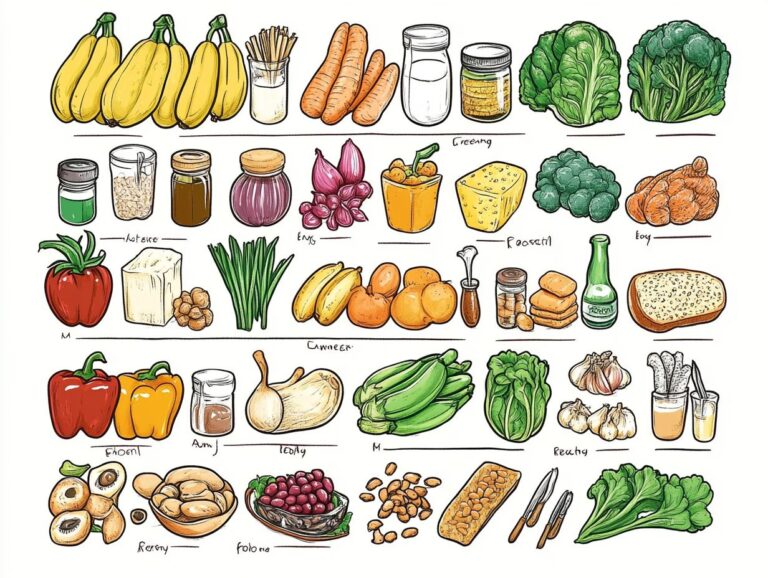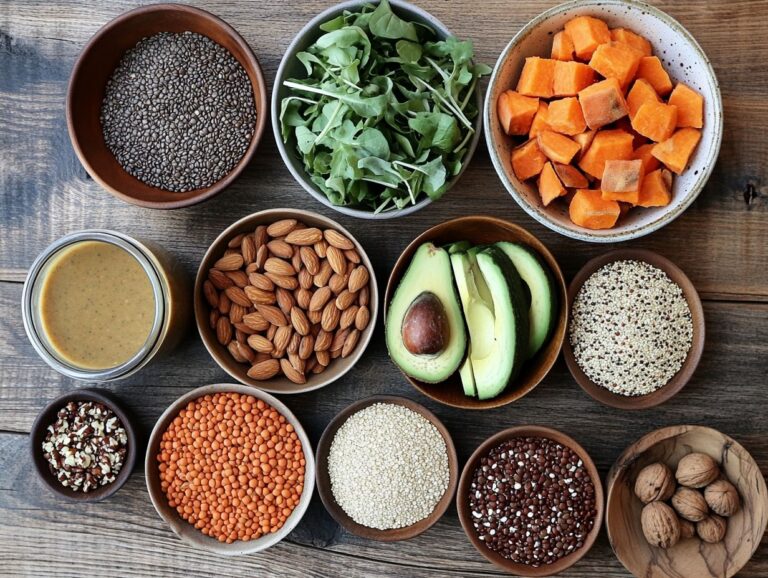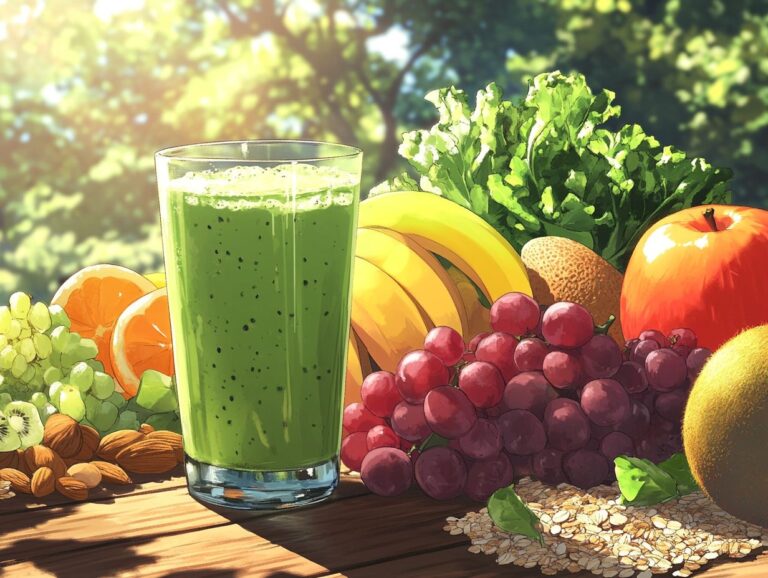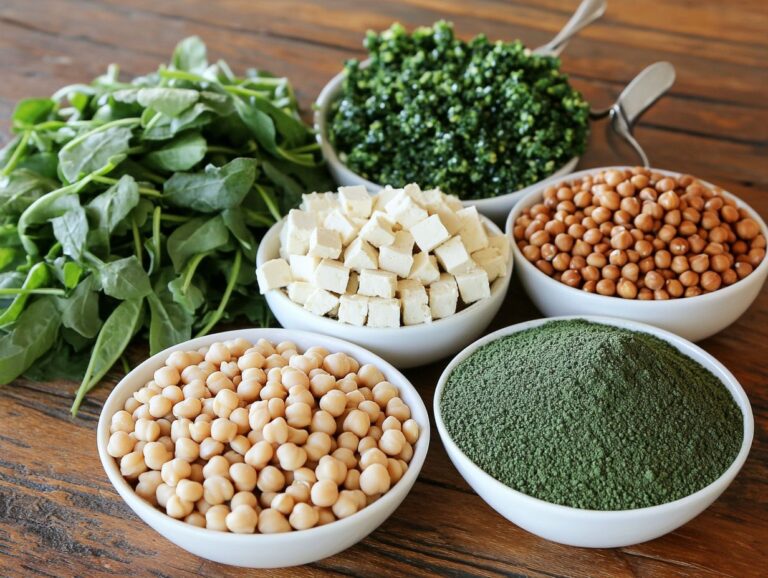The vegan no-carb diet is a unique dietary approach that merges the principles of veganism with a low-carbohydrate lifestyle, focusing on plant-based foods while eliminating carbohydrates. This diet explores its potential benefits as well as the associated risks. In this discussion, we provide practical tips for following a vegan no-carb diet, share meal ideas, and offer recommendations on whether this eating plan aligns with your health goals. We will delve into the details of this intriguing dietary approach.
Key Takeaways:
- A vegan no-carb diet eliminates all sources of carbohydrates, including fruits and grains, and focuses on plant-based protein sources and healthy fats like avocados and nuts.
- This diet may promote weight loss, lower the risk of chronic diseases such as heart disease, and increase intake of nutrient-dense foods, including vegetables and legumes.
- However, there are potential risks such as nutrient deficiencies, limited food choices, and difficulty meeting protein needs, particularly the essential amino acids. It’s important to consult with a registered dietitian and listen to your body to determine if this diet is right for you, as mentioned by Carrie Diulus.
What Is a Vegan No-Carb Diet?
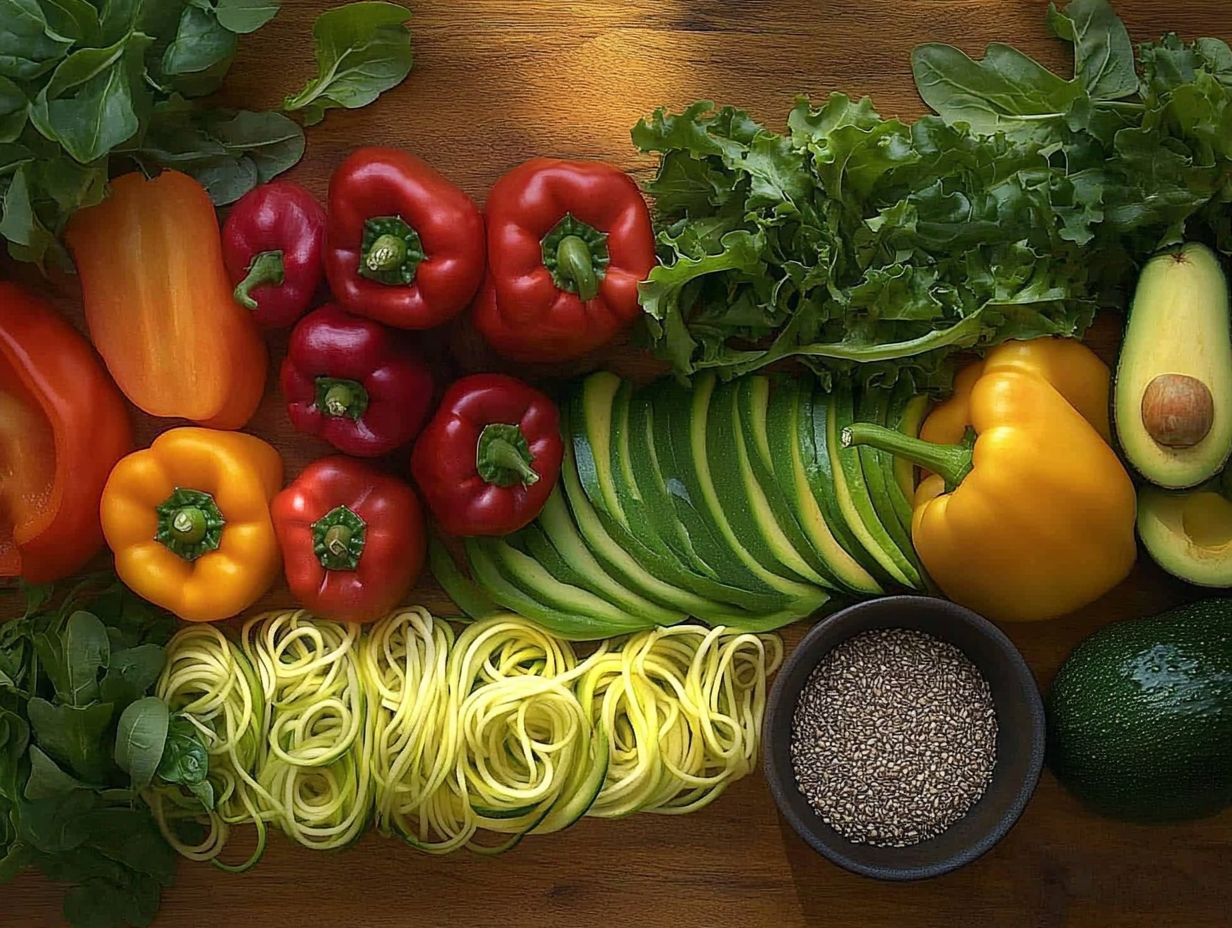
A Vegan No-Carb Diet is a dietary approach that focuses on eliminating carbohydrates while exclusively incorporating plant-based food sources. This method aims to promote a healthy lifestyle that supports weight loss and effectively manages blood pressure, potentially reducing the risk of diabetes.
The diet typically includes a variety of nutrient-dense foods, such as legumes, nuts, seeds, mushrooms, and vegetables, while ensuring adequate protein intake through alternatives like tofu, nutritional yeast, and lentils.
The primary objective of this diet is to enhance overall health by reducing insulin resistance and lowering the risk of chronic diseases, including heart disease, through improved dietary patterns and increased intake of healthy fats.
How Does a Vegan No-Carb Diet Work?
A vegan no-carb diet eliminates carbohydrates that can elevate glucose levels, which helps maintain steady blood sugar levels and reduce insulin resistance, ultimately leading to improved metabolic health.
This diet is composed of plant-based foods that are rich in protein and healthy fats, providing a consistent source of energy and meeting nutritional needs without relying on traditional carbohydrates from grains or sugars, aligning with the principles of vegan keto.
What Are the Benefits of a Vegan No-Carb Diet?
The Vegan No-Carb Diet offers several benefits, including effective weight control and, to a lesser extent, overall health improvement, making it an appealing choice for those seeking to enhance their well-being.
By eliminating carbohydrates, this diet can lead to weight loss, lower blood pressure, and a reduced risk of chronic diseases such as heart disease. It encourages the consumption of healthy foods, ensuring that individuals receive essential vitamins and nutrients from a diverse array of vegetables, healthy fat sources, and berries.
1. Promotes Weight Loss
The most notable benefit of the Vegan No-Carb Diet is its ability to promote weight loss. By eliminating carbohydrates, this diet reduces caloric intake and fosters improved insulin resistance.
Individuals following a Vegan No-Carb Diet tend to consume fewer calories while enjoying plant-based whole foods rich in healthy fats and protein, which helps them feel fuller on average. This contributes not only to weight loss but also to improved metabolic health.
Insulin resistance can make losing weight more challenging, often causing the last few pounds to remain stubbornly in place. However, reducing carbohydrate consumption significantly lowers insulin levels, encouraging the body to burn fat, which is a significant advantage of low-carb benefits.
A diet abundant in plant-based whole foods, which are high in vitamins, minerals, and fiber, also promotes satiety—an essential factor for successful weight loss. People who adhere to this type of diet often experience increased energy levels and fewer cravings, which can support their long-term health goals.
2. Lowers Risk of Chronic Diseases
The benefits of a vegan no-carb diet include a potential reduction in the risk of chronic diseases, particularly heart disease. This is largely due to the focus on healthy fats and nutrient-dense plant foods, while avoiding refined sugars and trans fats.
Such a diet can help manage blood pressure and enhance overall cardiovascular health, making it a proactive choice for individuals concerned about their long-term well-being.
Additionally, the high levels of antioxidants found in a variety of fruits and vegetables, including bell peppers and berries, can help reduce oxidative stress, which is associated with inflammation and chronic illnesses. This lifestyle often promotes the consumption of legumes and seeds, which provide essential amino acids and micronutrients vital for immune function and bone health.
By prioritizing foods that are naturally low in carbohydrates but high in fiber, individuals may experience improved digestive health. Overall, this comprehensive approach not only aids in weight management but also enhances blood sugar control, thereby lowering the risk of Type 2 diabetes.
3. Increases Intake of Nutrient-Dense Foods
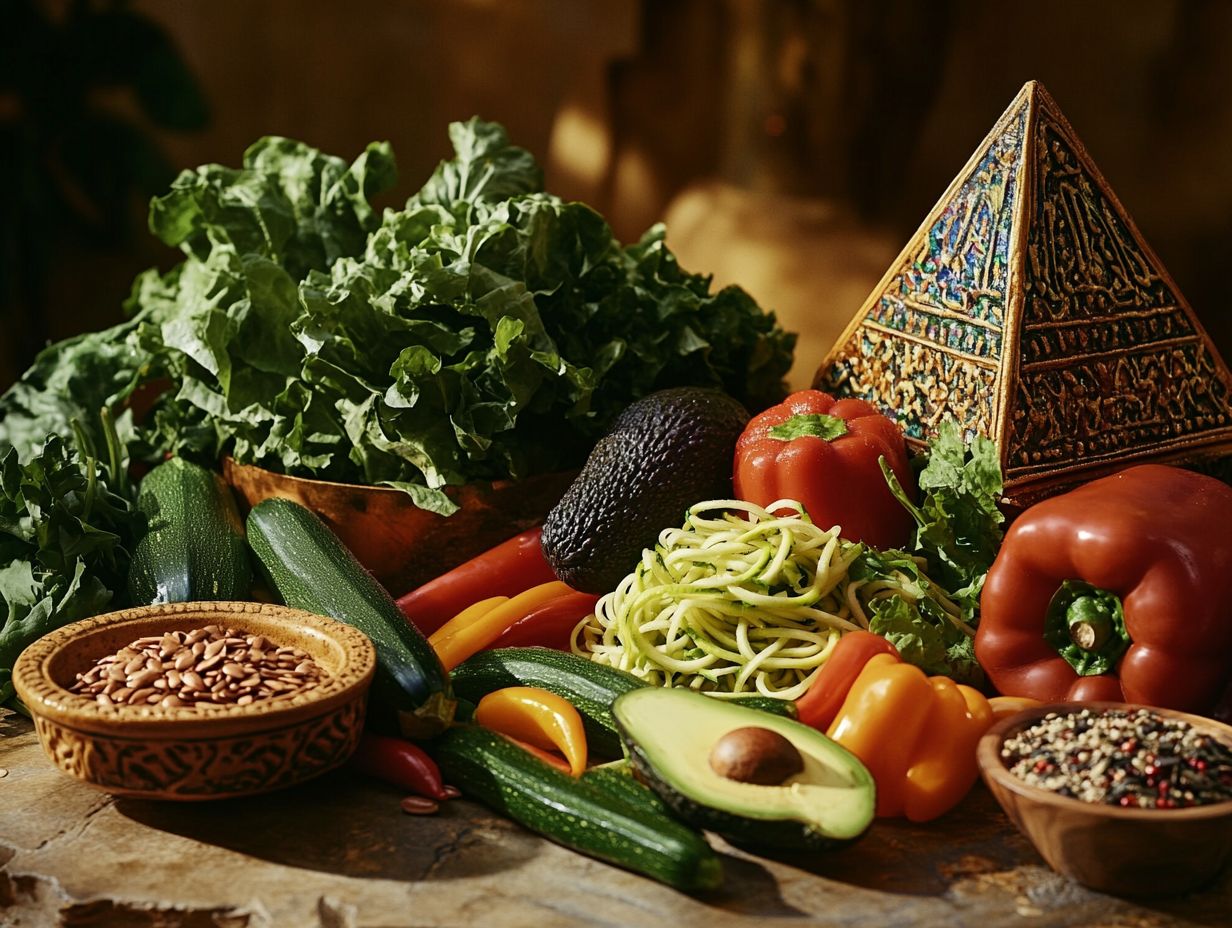
A Vegan No-Carb Diet significantly enhances the nutritional value of one’s meals by focusing on vegetables, legumes, and healthy fats, all of which supply essential vitamins and minerals needed for optimal health.
With the right food choices, individuals can enjoy a variety of flavors and textures while still meeting their nutritional requirements, which is crucial for maintaining energy levels and overall wellness.
Options such as leafy greens like spinach and kale, along with cruciferous vegetables like broccoli, cauliflower, and jackfruit, offer low-carbohydrate alternatives that are rich in antioxidants and fiber, promoting digestive health.
Additionally, avocados and nuts provide healthy fats that support heart health and promote a feeling of fullness. Spices like turmeric and garlic not only enhance flavor but also aid in nutrient absorption.
These selections make it easier to adhere to a Vegan No-Carb Diet.
What Are the Potential Risks of a Vegan No-Carb Diet?
The Vegan No-Carb Diet offers numerous health benefits; however, it is essential to consider the associated risks to ensure a balanced approach to nutrition.
One significant risk is the potential for nutrient deficiencies in vitamins and minerals typically found in foods rich in carbohydrates. Additionally, the limited food choices may make it challenging for some followers of the diet to meet their daily protein requirements and obtain all the essential amino acids necessary for muscle repair and overall health.
1. Nutrient Deficiencies
The most significant concern with a Vegan No-Carb Diet is the risk of nutrient deficiencies, particularly vitamin B12, and essential amino acids, which are often found in animal foods.
Without careful meal planning and supplementation, individuals may struggle to obtain adequate essential amino acids necessary for various bodily functions, potentially impacting their health and wellness. Iron and omega-3 fatty acids are two crucial nutrients that may be lacking in such dietary plans. Utilizing Eco-Atkins principles can guide meal planning to better meet these needs.
Although leafy greens and seeds do contain iron, their absorption is often less efficient than that of meat sources. To maintain adequate iron levels, incorporating fortified foods or supplements is advisable.
Sourcing omega-3 fatty acids can also be challenging; however, using flaxseeds, chia seeds, or algae oil can be beneficial.
By recognizing the importance of these nutrients and taking appropriate steps toward supplementation, individuals can maintain a balanced diet and support their long-term health.
2. Limited Food Choices
The Vegan No-Carb Diet offers limited food choices, as it restricts many items, including all fruits, grains, and starchy vegetables. This inherent limitation can lead to a monotonous diet, necessitating careful meal planning and creativity to maintain variety while adhering to the diet.
The lack of options may make it challenging to stick to the diet, which can decrease overall meal satisfaction. To make meals more enjoyable, individuals can explore alternative cooking methods and flavor profiles, such as incorporating spices or fresh herbs.
Additionally, creatively using alternative protein sources like legumes, nuts, and seeds can help in crafting satisfying meals. Planning meals around seasonal vegetables not only ensures freshness but also adds variety to the menu, thereby enhancing the diet’s appeal.
This approach allows individuals following the diet to enjoy wholesome food while still meeting their nutritional needs.
3. Difficulty Meeting Protein Needs
Meeting protein needs can be challenging on a vegan no-carb diet because many traditional protein sources either do not fit within a no-carb framework or are limited in availability due to the exclusion of grains and legumes in some variations of this diet.
Therefore, it is essential for individuals following this diet to identify and incorporate sufficient plant-based protein sources such as tofu, nuts, seeds, and nutritional yeast. This ensures they receive an adequate amount of protein necessary for maintaining muscle mass and overall health.
Balancing these protein-rich foods is crucial not only for physical strength but also for recovery and overall well-being. For instance, adding hemp seeds and chia seeds can significantly enhance protein intake while also providing healthy fats. Additionally, exploring options such as seitan—if gluten is not strictly avoided—can further boost protein levels.
It is advantageous for individuals on this diet to plan their meals thoughtfully, combining various sources to complete their amino acid profile and ensure they obtain all necessary nutrients. Regularly tracking meals can help monitor protein intake and ensure that dietary goals are met.
How to Follow a Vegan No-Carb Diet?
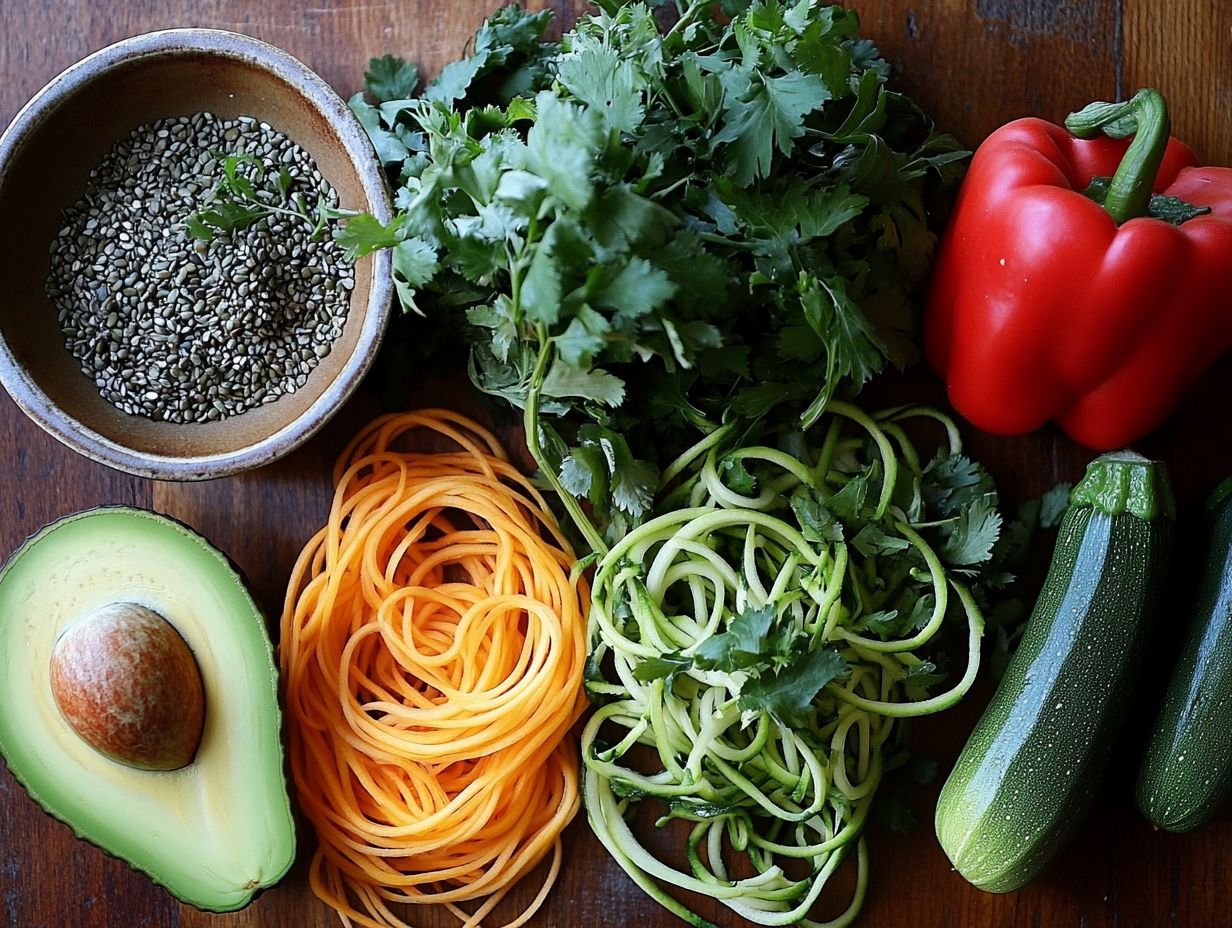
A Vegan No-Carb Diet can be successfully implemented through careful meal planning, ensuring that individuals have access to a variety of foods that meet their nutritional needs while adhering to the diet’s restrictions.
Key elements of a vegan no-carb diet that involve thoughtful meal planning include the following:
- Incorporating plant-based protein sources: Using options like tofu and legumes can provide essential amino acids while remaining low in carbohydrates.
- Including healthy fats: Adding healthy fats from sources such as avocados, nuts, and seeds can supply essential fatty acids and help individuals feel full and satisfied on a no-carb diet.
1. Focus on Plant-Based Protein Sources
Plant-based protein sources play a crucial role in a Vegan No-Carb Diet, as they provide essential amino acids and nutrients vital for overall well-being.
Foods such as tofu, lentils, and legumes are excellent ways for individuals to supplement their diets with adequate protein while adhering to a no-carb vegan meal plan.
Additionally, seeds like chia, pumpkin, and hemp are great choices because they not only offer protein but also supply essential fatty acids and fiber, which can enhance satiety and support digestive health.
Incorporating tempeh, a fermented soybean product, adds probiotics that are beneficial for gut health.
By thoughtfully selecting various plant-based protein options, individuals can enjoy a diverse array of delicious meals that fulfill their dietary needs without compromising their no-carb principles.
2. Incorporate Healthy Fats
Healthy fats play a crucial role in a Vegan No-Carb Diet by providing energy and supporting overall health, especially given the limited carbohydrate intake associated with this diet.
Foods such as avocados, nuts, and seeds not only enhance taste and texture but also supply essential fatty acids that promote heart health. These healthy fats are vital for maintaining hormonal balance and optimal brain function.
For instance, the omega-3 fatty acids found in flaxseeds and chia seeds are particularly important for cognitive health and may help reduce the risk of chronic diseases. Incorporating olives and olive oil into the diet provides monounsaturated fats, which have been shown to improve cholesterol levels.
Additionally, these fats facilitate the absorption of nutrients, enabling the body to effectively utilize fat-soluble vitamins. By deliberately including these foods, a Vegan No-Carb Diet offers a more comprehensive and healthful approach to well-being, even in a low-carb framework.
3. Plan Meals and Snacks Ahead of Time
Meal planning and preparing snacks in advance are essential strategies for successfully adhering to a Vegan No-Carb Diet, as they help prevent the temptation to consume non-compliant foods.
By planning meals around nutrient-dense vegetables, healthy fats, and plant-based protein sources, individuals can feel satisfied while achieving their dietary goals.
To get started with meal planning for a Vegan No-Carb Diet, create a weekly meal schedule that includes a variety of vegetables, such as:
- Leafy greens
- Cucumbers
- Bell peppers
These can be enjoyed in salads or as snacks. Incorporating healthy fats like avocados, nuts, and seeds can enhance flavor and promote satiety. Excellent protein options include:
- Tofu
- Tempeh
- Legumes
These serve as versatile staples. Preparing these components in advance allows for quick meal assembly and adds an element of creativity to the cooking process. Additionally, spices and herbs can be added to elevate flavor profiles, ensuring that every meal is unique while still adhering to the no-carb framework.
What Are Some Vegan No-Carb Meal Ideas?
The most effective meal ideas for a Vegan No-Carb Diet are those that maintain interest and offer a diverse range of nutrients.
Some enticing options include:
- A tofu and vegetable stir-fry featuring a variety of nutrient-dense vegetables.
- An avocado and chickpea salad rich in healthy fats and protein.
- A hearty cauliflower rice and lentil curry.
1. Tofu and Vegetable Stir-Fry
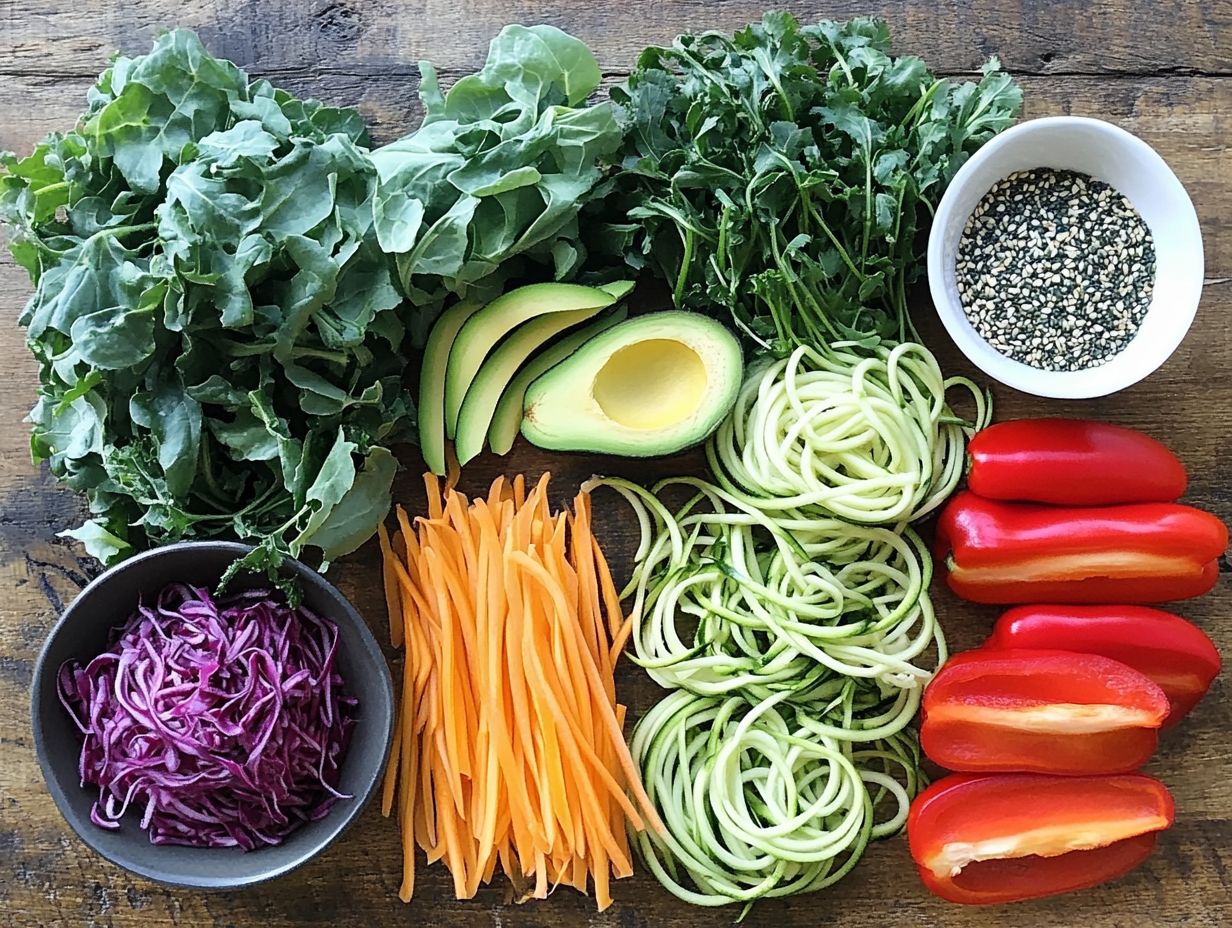
A Tofu and Vegetable Stir-Fry is a quick and satisfying meal option that highlights the versatility of tofu while incorporating a variety of nutrient-dense vegetables. This dish can be customized to suit individual tastes and can be prepared using healthy fats such as olive oil or sesame oil, enhancing both flavor and nutritional value.
By choosing firm or extra-firm tofu, you ensure a delightful texture that holds up well during cooking, providing a satisfying bite with every forkful. The vibrant array of vegetables—ranging from crunchy bell peppers and zucchinis to nutrient-rich broccoli and leafy greens—contributes essential vitamins and minerals, making this stir-fry not only colorful but also a powerhouse of health benefits.
Adding garlic and ginger can provide a zesty kick while boosting immunity. Additionally, this recipe can be easily adapted for those following a gluten-free or vegan lifestyle, allowing everyone to enjoy a hearty and nourishing dish.
2. Avocado and Chickpea Salad
The Avocado and Chickpea Salad is a refreshing and nutritious dish that combines creamy avocado with protein-rich chickpeas, making it a satisfying option for those on a Vegan No-Carb Diet. This salad is not only delicious but also packed with healthy fats and essential nutrients, ensuring a balanced meal.
Plus its vibrant flavors and textures, this nutrient-dense dish is incredibly easy to prepare, requiring minimal cooking, which makes it perfect for busy individuals seeking healthy options. Ripe avocados can be mashed, and cooked or canned chickpeas can be blended in, along with fresh herbs, lemon juice, and spices for added flavor.
The salad offers numerous health benefits, including heart-healthy fats, dietary fiber for improved digestion, and a wide range of vitamins and minerals. Thus, it serves not just as a meal but also as a significant boost to overall health and well-being.
3. Cauliflower Rice and Lentil Curry
Cauliflower Rice and Lentil Curry is a hearty meal that serves as a low-carb substitute for traditional rice dishes, while also incorporating the nutritional benefits of lentils and cauliflower.
This dish can be enhanced with a variety of spices, aligning perfectly with a Vegan No-Carb Diet. The ingredients provide a high concentration of essential vitamins and minerals, including vitamin C, fiber, and protein, all of which contribute to a healthy lifestyle by promoting effective weight management and improving digestive health.
To prepare the meal, cauliflower is grated to create rice-like granules, and lentils are simmered in a rich blend of spices. This combination is typically low in calories yet very filling, making it an excellent choice for those looking to reduce their carbohydrate intake.
Is a Vegan No-Carb Diet Right for You?
To determine whether a Vegan No-Carb Diet is suitable for you, assess your health objectives, dietary habits, and individual nutritional requirements.
This diet may be beneficial for individuals looking to lose weight, lower blood pressure, or decrease insulin resistance. However, it is important to consider personal preferences and the potential challenges associated with such a restrictive diet.
1. Consider Your Health Goals
The Vegan No-Carb Diet is ideal for individuals aiming to lose weight, lower blood pressure, and improve insulin resistance. This diet is particularly suitable for those looking to enhance metabolic health and reduce the risk of chronic diseases, provided they are willing to make the necessary dietary adjustments.
It promotes a higher intake of nutrient-dense foods, quality plant proteins, and beneficial fats. Consequently, individuals committed to the principles of this lifestyle are likely to experience increased energy levels and an overall improvement in their health.
Incorporating a variety of vegetables, nuts, and seeds ensures a wide range of essential vitamins and minerals that support physiological functions. By aligning food choices with personal health goals, individuals can enhance their physical performance and overall well-being.
2. Consult with a Registered Dietitian
Seeking the assistance of a registered dietitian is crucial before starting a Vegan No-Carb Diet, as they can help individuals design dietary patterns that cater to their unique nutritional and personal needs.
A dietitian’s personalized guidance in meal planning ensures that individuals can achieve their health goals while receiving the necessary nutrients. Their expertise is especially important in addressing the challenges that may arise from restrictive eating patterns.
Many people might struggle to meet their protein requirements along with their vitamin and mineral needs when both animal products and carbohydrates are eliminated from their diets.
With the support of a dietitian, individuals can explore a variety of plant-based protein sources and receive recommendations for incorporating nutrient-dense vegetables and healthy fats while avoiding unwanted carbohydrates.
This guidance fosters a more balanced approach and enhances the long-term sustainability of a vegan no-carb diet, ultimately leading to improved health and satisfaction.
3. Listen to Your Body
Listening to your body is essential when following a Vegan No-Carb Diet, as it helps you understand how changes in your meals affect your energy levels and hunger. Being mindful of your physical sensations allows you to make the necessary adjustments to your dietary patterns, incorporating nutrient-dense foods like vegetables, nuts, and seeds to ensure the maintenance of a healthy lifestyle with adequate protein intake.
Additionally, being aware of how different foods impact your body enables you to identify which plant-based options, such as legumes, tofu, and avocados, provide energy and satiety for longer periods. These observations can enhance your ability to thrive on a vegan no-carb diet by incorporating essential amino acids and healthy fats.
Recognizing feelings of hunger or fatigue can aid in better meal planning and help you resist the temptation to restrict your intake excessively. Understanding the connection between emotions and eating can lead to improved choices, thus benefiting your health by managing insulin resistance and supporting weight loss.
This process of self-awareness fosters better eating practices and strengthens the mind-body connection, which is crucial for long-term success, potentially reducing risks of heart disease and diabetes while maintaining healthy blood pressure levels.
